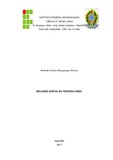Inclusão digital na terceira idade

Visualizar/
Data
2017-08-30Autor
Gomes, Amanda Ohana Albuquerque
http://lattes.cnpq.br/6176035722563629
Metadado
Mostrar registro completoResumo
As the country experiences a rapid process of population aging, society is becoming computerized and increasingly dependent on electronic resources, such as social networks, for example, facebook, whatsapp, among others. Technology has invaded homes, businesses and society as a whole, becoming a necessity and increasingly leading to machine-mediated communication. The Computer is a representative of these technologies as well as the Internet a great tool that presents a communicational potential never detected in previous technologies. Given this scenario, this paper presents some of the difficulties and barriers encountered by the elderly, regarding new technologies and their aging, and possibilities of transposing them, showing ways to be resolved, focused on the interest of the elderly in learning computer technology that brings us. A different view from that of the elderly patient, hospitalized in nursing homes, dependent, etc. Breaking the stigma of the elderly as incapable and inactive, showing how the third age is becoming a period of learning and conquest of new potentialities, that is, socialization, redefining the social role. The Statute of the Elderly, which came into force in 2004 in Brazil, is also included, and is among the victories of the Third Age, which established that the Public Power should target not only the literacy itself, but also create Special courses that bring direct and indirect benefits to the life of the elderly in society. Finally, we can see that globalized society is characterized by greater accessibility to information and by the active use of the different experiences it provides, thus, the elderly individual is not different from another, and has expanded his universe of opportunities and awareness to the Make use of information technology.



